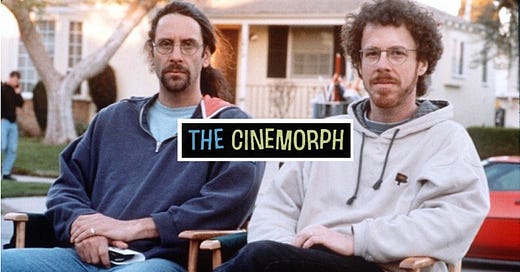In 1981 Sam Raimi released Evil Dead, which shocked and electrified horror fans (Stephen King among them) and gave the first-time director his start in the business. The film was edited, in part, by a young Joel Coen, who would go on to become the Joel Coen half of Joel and Ethan Coen, ie, the Coen Brothers. But this was long before Sam Raimi and the Coen Brothers were “Sam Raimi and The Coen Brothers,” they were ambitious young filmmakers who wanted to follow up Evil Dead with a full-fledged collaboration. The resulting film is barely a footnote to their filmographies. How? What happened with Crimewave?
Inspired by Raimi’s success with Evil Dead, Joel Coen began work on his own film, with his brother Ethan, which would eventually become Blood Simple. He also sent Raimi another script he’d been working on called Relentless, the story of two serial killers. Bruce Campbell, Raimi’s friend, co-producer, and Evil Dead star, read Relentless and loved it. Raimi, Joel Coen and his brother Ethan began collaborating on it.
With talent like this, you’d think Crimewave, as Relentless would eventually be titled, would have turned out to be a cult cinematic touchstone. Yet, it stands as the movie equivalent of a novice band's tricky second album. A cursed experience in which nothing could go right.
Crimewave is a combination film noir-crime thriller-slapstick comedy. This is a tricky feat to pull off under the best of circumstances and I think the Coens finally bullseye'd what they were after years later with their film Fargo. Pulling off a tone as specific as Crimewave's requires not only a deft touch and singular vision but the authority to enforce both. But with Crimewave, from the outset and through no fault of his own, Raimi was hamstrung in his attempts to control his own movie. `
Sam Raimi and Bruce Campbell in, I'm guessing, 2020 at, I'm guessing, the premiere of The Grudge.
To begin with, the film’s studio, Embassy Pictures, was far more eager to tinker with Crimewave than previous money man Irvin Shapiro was with Evil Dead. Embassy’s first requirement was making Raimi’s leading man, Bruce Campbell, who so masterfully toplined Evil Dead, audition for the lead in Crimewave. Neither Raimi nor Campbell were pleased with the demand, but it was Embassy’s money, so they were professionals, and Bruce auditioned. Their reward for playing along? The studio turned him down flat. Raimi then expanded a lesser role in the film, that of Renaldo “The Heel,” and gave it to Campbell.
In his 2002 memoir, If Chins Could Kill: Confessions Of A B-Movie Actor, Campbell recalls the Crimewave experience with little love lost, lamenting the “excruciatingly specific and alternately vague” demands of the studio. Other mistakes were made, including a budget that didn’t factor in union fees or last-minute gouging on location rentals. As soon as the film went over schedule and over budget, which was quickly, Embassy stepped in and started exerting control. This did not, in any way, make things easier, better or cheaper.
Then there were things that just… happened. According to “If Chins Could Kill,” one night co-star Brion James (Blade Runner’s Leon) trashed his hotel room because ghosts, which were hiding in the lightbulbs.
Okey doke!
When the film was completed, Embassy replaced Raimi's composer and editor and, in a move that seems more spiteful than anything else, refused to pay for co-producer Campbell’s accommodations in Los Angeles during post. When it was finally ready to go, Crimewave had the most bizarre release of any film I’ve ever heard of. It played in Santa Cruz, CA. Kansas and Alaska. The big three!
And then it sank like a stone. This put Raimi’s career in a precarious position. As Campbell noted, for lesser men, Crimewave would have been a career ender. But Raimi, with his back against the wall, played the only card he had.
A sequel to Evil Dead.
Next time.





